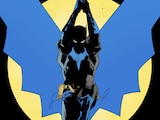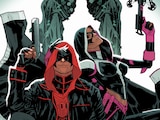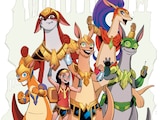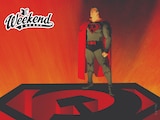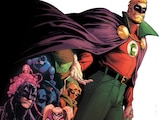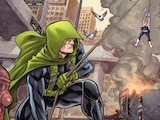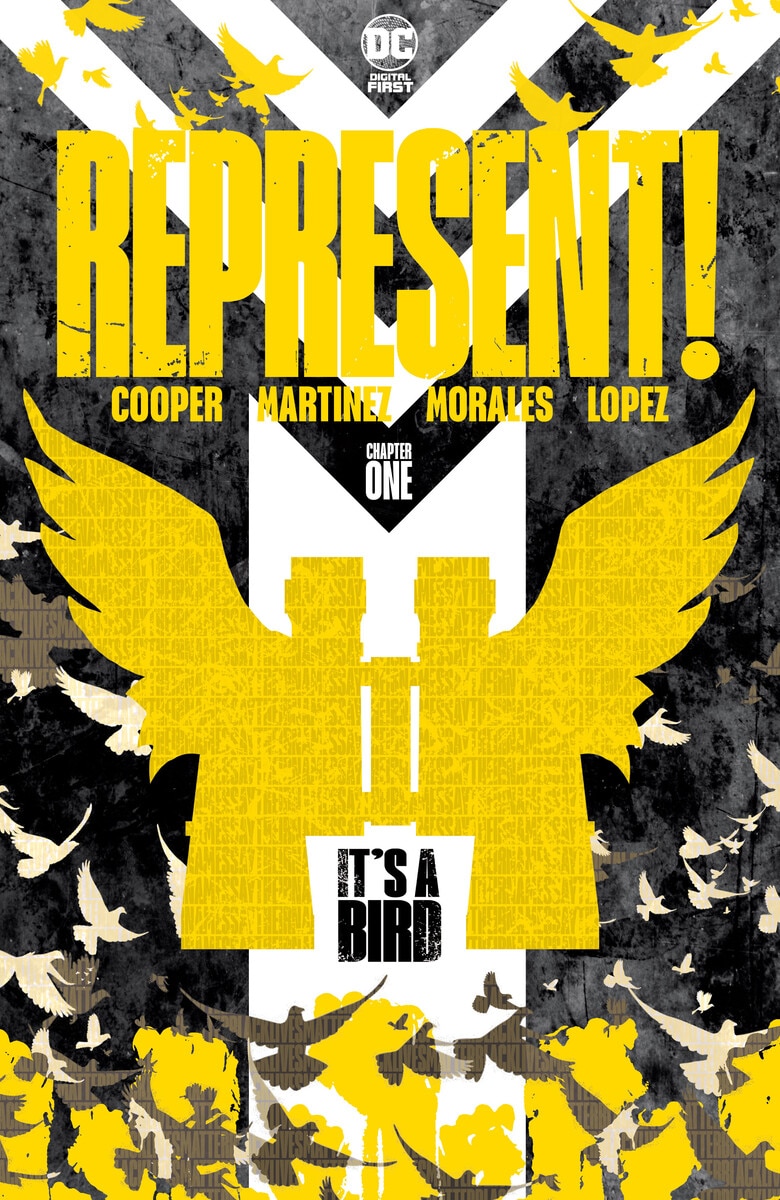
Comic books have rightly been praised for their ability to offer an escape, with thrilling tales of good vs. evil entertaining fans for decades. Yet the true power of comics as a medium is that it can tell any kind of story with power, style, and resonance—as seen in DC’s new digital-first anthology series, Represent!, which launches today with “It’s a Bird” by writer Christian Cooper, artist Alitha E. Martinez, inker Mark Morales, colorist Emilio Lopez, and letterer Rob Clark Jr.
As Executive Editor Marie Javins puts it, this first chapter of Represent! aims to “showcase and introduce creators traditionally underrepresented in the mainstream comic book medium.” It starts with Cooper—a former comics editor and writer returning to the industry after two decades away—drawing inspiration from his real-life experience on May 25 of this year, when, while birdwatching in Central Park, a woman called 9-1-1 to falsely report that Cooper was “threatening” her and her dog in a charged attempt to leverage pre-existing bias and systemic racism.
That same day, George Floyd was killed by police in Minneapolis, Minnesota, igniting a summer of protests calling for change and bringing further attention to incidents of police brutality against Black people, such as the shooting of Breonna Taylor, who was killed by police in March in her Louisville, Kentucky home.
All of the above fuels “It’s a Bird,” which tells the story of a young Black birdwatcher gifted with a pair of binoculars that allow him to learn the stories of Amadou Diallo, Breonna Taylor, and George Floyd. Cooper, Martinez, and Morales all joined a conference call to discuss the first chapter of Represent!.
Given how rooted this is in real life, Represent! and specifically this first chapter feels like something unexpected from DC, in all the right ways. How did this story come together?
Christian Cooper: Marie and (VP, Global Publishing Initiatives & Digital Strategy) Bobbie Chase approached me about possibly doing a comic story that tapped into my experience. I thought, “I don’t know, DC Comics? Superheroes? Not sure how that’s going to work.” We kicked around a couple of ideas. They said they had gotten the title, I’m not sure exactly from who, but somebody pretty high up in the DC food chain: “It’s a Bird.” It took me half a beat. “Oh…I get what you did there.” Once I had the title, the story wrote itself.
Alitha E. Martinez: I didn't see it coming. It was really something to get the script and read through it, because it's such a powerful experience.
This is an undeniably powerful and poignant story, involving very real tragedies and injustices. What was it like putting those emotions into a comic book story—especially as it draws upon Christian’s first-hand experience?
Cooper: When I saw the artwork come back, there were aspects of it that made me gasp, just seeing it.
Martinez: Not a lot of people know—I came back into this country as a child, and I was deported. I know how those children in lockup feel. I know how it feels to have your birthday changed. I know how it feels to have everything taken from you. That’s something I kept pressed inside of me for many years.
So when I see this new wave of outrage, I realize it’s a long history. It’s never ending. I wish this story could have been that punctuation of, “…and we all lived happily ever after.” But it just keeps coming. It wasn’t until the colors (by Emilio Lopez) came in that it really hit home for me—something that really hit on that experience. Because it never goes away. It just gets layered.
Cooper: There are a lot of emotions to the whole thing. I like the journey the young character goes through, from naïve and flippant; to the end, he’s quite sober about everything.
When I see the violent images, they really made me gasp at the power of them. The one that really hurt me was the one of Breonna Taylor—just the idea of someone losing their life in that way.
The most important part for me is the last two pages, because of what they focus on. That person chattering away, trying to make it all about her, and our character turns his back on her. And her voice becomes smaller and smaller, because she is insignificant, and what matters is the ones we’ve lost, and how we keep from losing any more. And that’s what he turns his attention to on that last page. I think that’s probably the most important message in the whole thing.
A lot of the times we think of comic book as escapism, and “It’s a Bird,” by its nature is the opposite of that. What do you see as the capacity of comics to tell a story like this?
Mark Morales: Comics have a way, because of the combination of words and pictures together, of giving you a different feeling than just reading a novel. You can put yourself into the story more. Comic books have a unique way to portray stories like we’re doing here. If it was just written out, I don’t know if it would work—the visuals Alitha put to it really put it over the top, and make you feel what the characters are feeling. I don’t know if that could have been done in any other medium.
Cooper: The thing I always come back to is, with comics, anything is possible. With film, with television, there are budget limitations. With comics, there are no limits. Whatever you can put with pen on paper, can come to life and appear in ways that are so stylized that it intensifies the storytelling, and intensifies the drama, as Alitha has done.
Who do you see as the audience for this story? Of course we want traditional comic book fans to read it, but this feels like a story has the capacity to reach a very broad audience—and that it should.
Morales: It certainly is a timely story. It will be interesting to see who finds this, and comments on it, and what the comments will be.
Martinez: I think it’s a golden ticket. It’s for everybody to read. That’s what comics are to me. To me, comics mean integrity and morality. I expect a certain level of drama—my good guys are going to beat the bad guys. I know, real naïve.
Cooper: I hope as many people as possible read it, but I’m hoping in particular that young people read it. I think a lot of them may not know some of these stories, particularly as we got into detail in the appendix. We not only give the bare bones details of how they died, but also a little bit about them, because they were people. They weren’t just want happened to them.
I hope young people read it, and that they’re inspired to keep the focus where it needs to be, which is on those we have lost and how we keep from losing more. There are people who are invested in distracting us right now, and there are people who want to distract us from their failures on so many other things. That’s not what this moment is about. This moment is about the ones we’ve lost, and how we’re going to keep from losing any more. And if you’re not talking about that, I don’t want to hear it.
Alitha, people know your work mainly from the superhero genre. What was your approach to a story that was so inherently grounded in reality?
Martinez: After 21 years, I like to push myself and try new things. It was having to look into real faces, and draw them, and try to bring in that moment I find so significant in comics: that heroic moment. You’re going, “Am I doing it justice?” I have to fall back what I know: my roots, the cape and tights. The iconic moments.
Cooper: One of the beauties of your artwork is how you capture facial expressions so well. The last panel of the sixth page, right after the main character is seeing George Floyd’s death—he goes on a journey from flippant to very sober, and you captured that sober expression so perfectly in that panel.
Martinez: I saw that look on my son’s face three years ago after we left North Carolina, and we were coming home to New York. We were stopped going into the airport. We travel so often—cons, in and out of the country. These two security guards started to harass us. They wanted to take my purse. “Where are you from?” You hear my voice, there’s no accent in my voice. It ended up with them saying, “You should travel with your passport.” This is after backing us up in the corner, and why? I’m an American citizen born on this soil, so is my son. I don’t need a passport to travel within my country. This is our day and age.
I watched my son’s face change, and he never quite walked up again looking happy going to the airport. Now he has on armor. That face you see? That’s my kid.
Christian, this is actually your returns to comics after many years away from the medium. What was that like for you, and do you see this as the start of doing more in the field?
Cooper: When I was sitting down to do this, I’m like, “This is the first comics story I’ve written in 20 years. I don’t know what I’m doing. I can’t resurrect that part of myself.” Then I started writing it, and I’m like, “Not only can I do this, but I’m having a hell of a lot of fun! Finally! At last!”
It was wonderful to return to comics format, and it felt right. It felt natural. As I said, there are no limits to what you can do in comics. I think that is a large part of what made me create this particular approach to the story, with so many different elements of my experience—from the binoculars themselves which are passed down, from generation to generation. In real life, the binoculars that I use were a birthday gift from my dad, who was very active in the Civil Rights movement, and was a Korean War vet. All of these real elements combine with these fantastical elements to create something that is more than the sum of its parts, I hope. That’s something that comics do so magnificently well.
It was wonderful to be back in comics, and I hope to do more. We’ll see!
This is a bleak time in history in a lot of ways. But still, there's hope to be found, and it feels like this story ends on something of an optimistic note. What’s it like to find optimism in this time, when that’s not an easy thing to do?
Martinez: Is it optimism, or is it strength at that point, because nothing can hurt you anymore? At that point you’re beyond those terrible moments that we saw earlier.
Cooper: I didn’t see it as optimism so much as a moment of grace—giving in fiction, at least, what these people didn’t get in life. A grace note finale to what happened to them.
If I find optimism in this present moment, I’m very stingy with that. I do not want to give that up. We have been here so many times. So when the latest happened, and all these protests erupted, and things were so widespread and seemed to keep going, I was still really stingy. “We’ve been here before. This isn’t any different.”
I’ve allowed myself the slightest bit of hope that this time actually things will be different. Not going to solve everything. We’re not going to suddenly reach a happy la la land where systemic racial bias has been lifted from the land, but I see the potential for at least some progress this time. Some substantive progress. And I say that because so many young people are involved, and they are the future—and because so many people of all ethnicities were out in the street, and the protests are sustained.
Morales: The story was infuriating, because this thing keeps going on and on. It’s been going on for centuries. I’m pretty much an optimistic person at heart. I have a son—you hope that things incrementally get better and better as time goes on. I think the story has that roller coaster of emotions, where you can take some optimism out of it at the end.
As Executive Editor Marie Javins puts it, this first chapter of Represent! aims to “showcase and introduce creators traditionally underrepresented in the mainstream comic book medium.” It starts with Cooper—a former comics editor and writer returning to the industry after two decades away—drawing inspiration from his real-life experience on May 25 of this year, when, while birdwatching in Central Park, a woman called 9-1-1 to falsely report that Cooper was “threatening” her and her dog in a charged attempt to leverage pre-existing bias and systemic racism.
That same day, George Floyd was killed by police in Minneapolis, Minnesota, igniting a summer of protests calling for change and bringing further attention to incidents of police brutality against Black people, such as the shooting of Breonna Taylor, who was killed by police in March in her Louisville, Kentucky home.
All of the above fuels “It’s a Bird,” which tells the story of a young Black birdwatcher gifted with a pair of binoculars that allow him to learn the stories of Amadou Diallo, Breonna Taylor, and George Floyd. Cooper, Martinez, and Morales all joined a conference call to discuss the first chapter of Represent!.
Given how rooted this is in real life, Represent! and specifically this first chapter feels like something unexpected from DC, in all the right ways. How did this story come together?
Christian Cooper: Marie and (VP, Global Publishing Initiatives & Digital Strategy) Bobbie Chase approached me about possibly doing a comic story that tapped into my experience. I thought, “I don’t know, DC Comics? Superheroes? Not sure how that’s going to work.” We kicked around a couple of ideas. They said they had gotten the title, I’m not sure exactly from who, but somebody pretty high up in the DC food chain: “It’s a Bird.” It took me half a beat. “Oh…I get what you did there.” Once I had the title, the story wrote itself.
Alitha E. Martinez: I didn't see it coming. It was really something to get the script and read through it, because it's such a powerful experience.
This is an undeniably powerful and poignant story, involving very real tragedies and injustices. What was it like putting those emotions into a comic book story—especially as it draws upon Christian’s first-hand experience?
Cooper: When I saw the artwork come back, there were aspects of it that made me gasp, just seeing it.
Martinez: Not a lot of people know—I came back into this country as a child, and I was deported. I know how those children in lockup feel. I know how it feels to have your birthday changed. I know how it feels to have everything taken from you. That’s something I kept pressed inside of me for many years.
So when I see this new wave of outrage, I realize it’s a long history. It’s never ending. I wish this story could have been that punctuation of, “…and we all lived happily ever after.” But it just keeps coming. It wasn’t until the colors (by Emilio Lopez) came in that it really hit home for me—something that really hit on that experience. Because it never goes away. It just gets layered.
Cooper: There are a lot of emotions to the whole thing. I like the journey the young character goes through, from naïve and flippant; to the end, he’s quite sober about everything.
When I see the violent images, they really made me gasp at the power of them. The one that really hurt me was the one of Breonna Taylor—just the idea of someone losing their life in that way.
The most important part for me is the last two pages, because of what they focus on. That person chattering away, trying to make it all about her, and our character turns his back on her. And her voice becomes smaller and smaller, because she is insignificant, and what matters is the ones we’ve lost, and how we keep from losing any more. And that’s what he turns his attention to on that last page. I think that’s probably the most important message in the whole thing.
A lot of the times we think of comic book as escapism, and “It’s a Bird,” by its nature is the opposite of that. What do you see as the capacity of comics to tell a story like this?
Mark Morales: Comics have a way, because of the combination of words and pictures together, of giving you a different feeling than just reading a novel. You can put yourself into the story more. Comic books have a unique way to portray stories like we’re doing here. If it was just written out, I don’t know if it would work—the visuals Alitha put to it really put it over the top, and make you feel what the characters are feeling. I don’t know if that could have been done in any other medium.
Cooper: The thing I always come back to is, with comics, anything is possible. With film, with television, there are budget limitations. With comics, there are no limits. Whatever you can put with pen on paper, can come to life and appear in ways that are so stylized that it intensifies the storytelling, and intensifies the drama, as Alitha has done.
Who do you see as the audience for this story? Of course we want traditional comic book fans to read it, but this feels like a story has the capacity to reach a very broad audience—and that it should.
Morales: It certainly is a timely story. It will be interesting to see who finds this, and comments on it, and what the comments will be.
Martinez: I think it’s a golden ticket. It’s for everybody to read. That’s what comics are to me. To me, comics mean integrity and morality. I expect a certain level of drama—my good guys are going to beat the bad guys. I know, real naïve.
Cooper: I hope as many people as possible read it, but I’m hoping in particular that young people read it. I think a lot of them may not know some of these stories, particularly as we got into detail in the appendix. We not only give the bare bones details of how they died, but also a little bit about them, because they were people. They weren’t just want happened to them.
I hope young people read it, and that they’re inspired to keep the focus where it needs to be, which is on those we have lost and how we keep from losing more. There are people who are invested in distracting us right now, and there are people who want to distract us from their failures on so many other things. That’s not what this moment is about. This moment is about the ones we’ve lost, and how we’re going to keep from losing any more. And if you’re not talking about that, I don’t want to hear it.
Alitha, people know your work mainly from the superhero genre. What was your approach to a story that was so inherently grounded in reality?
Martinez: After 21 years, I like to push myself and try new things. It was having to look into real faces, and draw them, and try to bring in that moment I find so significant in comics: that heroic moment. You’re going, “Am I doing it justice?” I have to fall back what I know: my roots, the cape and tights. The iconic moments.
Cooper: One of the beauties of your artwork is how you capture facial expressions so well. The last panel of the sixth page, right after the main character is seeing George Floyd’s death—he goes on a journey from flippant to very sober, and you captured that sober expression so perfectly in that panel.
Martinez: I saw that look on my son’s face three years ago after we left North Carolina, and we were coming home to New York. We were stopped going into the airport. We travel so often—cons, in and out of the country. These two security guards started to harass us. They wanted to take my purse. “Where are you from?” You hear my voice, there’s no accent in my voice. It ended up with them saying, “You should travel with your passport.” This is after backing us up in the corner, and why? I’m an American citizen born on this soil, so is my son. I don’t need a passport to travel within my country. This is our day and age.
I watched my son’s face change, and he never quite walked up again looking happy going to the airport. Now he has on armor. That face you see? That’s my kid.
Christian, this is actually your returns to comics after many years away from the medium. What was that like for you, and do you see this as the start of doing more in the field?
Cooper: When I was sitting down to do this, I’m like, “This is the first comics story I’ve written in 20 years. I don’t know what I’m doing. I can’t resurrect that part of myself.” Then I started writing it, and I’m like, “Not only can I do this, but I’m having a hell of a lot of fun! Finally! At last!”
It was wonderful to return to comics format, and it felt right. It felt natural. As I said, there are no limits to what you can do in comics. I think that is a large part of what made me create this particular approach to the story, with so many different elements of my experience—from the binoculars themselves which are passed down, from generation to generation. In real life, the binoculars that I use were a birthday gift from my dad, who was very active in the Civil Rights movement, and was a Korean War vet. All of these real elements combine with these fantastical elements to create something that is more than the sum of its parts, I hope. That’s something that comics do so magnificently well.
It was wonderful to be back in comics, and I hope to do more. We’ll see!
This is a bleak time in history in a lot of ways. But still, there's hope to be found, and it feels like this story ends on something of an optimistic note. What’s it like to find optimism in this time, when that’s not an easy thing to do?
Martinez: Is it optimism, or is it strength at that point, because nothing can hurt you anymore? At that point you’re beyond those terrible moments that we saw earlier.
Cooper: I didn’t see it as optimism so much as a moment of grace—giving in fiction, at least, what these people didn’t get in life. A grace note finale to what happened to them.
If I find optimism in this present moment, I’m very stingy with that. I do not want to give that up. We have been here so many times. So when the latest happened, and all these protests erupted, and things were so widespread and seemed to keep going, I was still really stingy. “We’ve been here before. This isn’t any different.”
I’ve allowed myself the slightest bit of hope that this time actually things will be different. Not going to solve everything. We’re not going to suddenly reach a happy la la land where systemic racial bias has been lifted from the land, but I see the potential for at least some progress this time. Some substantive progress. And I say that because so many young people are involved, and they are the future—and because so many people of all ethnicities were out in the street, and the protests are sustained.
Morales: The story was infuriating, because this thing keeps going on and on. It’s been going on for centuries. I’m pretty much an optimistic person at heart. I have a son—you hope that things incrementally get better and better as time goes on. I think the story has that roller coaster of emotions, where you can take some optimism out of it at the end.
###
DC encourages you to share this story with friends and family and to talk about how you can inspire change in your communities. Many organizations—including Color of Change, Equal Justice Initiative, NAACP Legal Defense & Educational Fund, National Center for Civil and Human Rights, National Urban League, and the Bail Project—are also working to advance social justice and civil rights in support of #BlackLivesMatter.
Cooper, Martinez and Morales' story, “It’s a Bird,” colored by Emilio Lopez, lettered by Rob Clark, Jr. and edited by Marie Javins and Liz Erickson, is available now, offered for free only on participating digital platforms, including readdc.com, Comixology, Amazon Kindle, Apple Books, and more. Look for more from DC’s Represent! storytellers in 2021.

